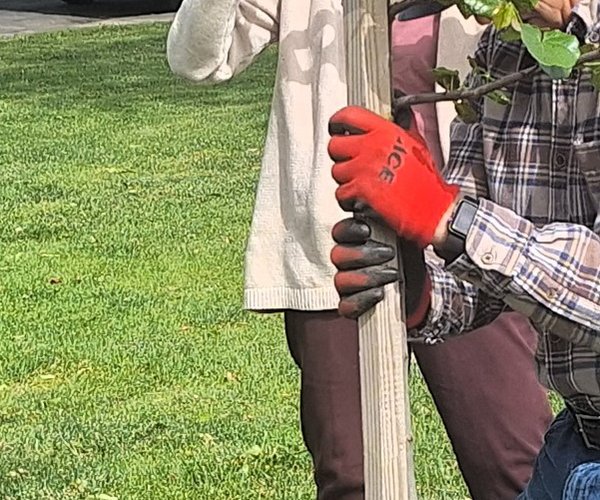Safeway opened a 55,562-square-foot supermarket in Mountain House on Tuesday.
It may not sound like a big deal but consider this: Living in Mountain House prior to Tuesday was the equivalent of living in Lathrop and only having one 7-Eleven in town for grocery shopping.
It means residents no longer have to battle Interstate 205 corridor or maneuver the congested Grantline Road commercial area to do basic grocery shopping.
It is not the only big thing coming to Mountain House.
*The first apartment complex is under construction near the town center.
*A second apartment house is now being proposed near the new alignment of Valley Link — a commuter rail line designed to connect the BART station in Pleasanton/Dublin with Lathrop that has a targeted start date of 2028.
*Ground breaking is nearing on the first 1,000 of roughly 5,000 homes on the north side of the Byron Road.
Mountain House with a population of 28,000 or roughly 3,000 people less than Lathrop is working toward becoming San Joaquin County’s eighth incorporated city.
Mountain House Community Services District General Manager Steve Pinkerton noted an incorporation election could occur in either November 2023, March 2024, or November 2024.
It all depends on the completion of a $70,000 feasibility study commissioned earlier this year by the San Joaquin County Board of Supervisors. The study will determine if it is financially possible to create California’s 483rd incorporated city.
Next month marks the 20th anniversary of when the first foundation was poured on Jan. 18, 2003 in the planned community 11 miles northwest of Tracy and 18 miles from Manteca.
The San Joaquin County Board of Supervisors in the mid-1990s made a decision to award Mountain House the privilege of being a master planned community in a rural area of the county.
The project was the victory in a three-way race for the housing opportunity the county was creating. San Joaquin County — in a bid to protect agriculture — years prior had imposed zoning that made it difficult to break 80, 40, and 20 acre parcels into smaller parcels. It was enough to thwart developers from trying to amass rural land to cobble together large subdivision projects.
The idea was to not simply direct urbanization into cities but to prevent pockets of urbanized incorporated areas such as Raymus Village to pop up wily-nilly across San Joaquin County’s 1,426 square miles that stretch from the heart of the Delta to the rolling terrain of the lower Sierra foothills.
The decision to move forward with Mountain House came just as the state implemented the Excess Educational Revenue Augmentation Fund Revenue plan. It shifted some of the property taxes counties collected to help fund schools and community colleges.
The supervisors, not wanting to create a burden on the rest of the county by allowing Mountain House to move forward, required passage of a special tax to assure housing would essentially pay its own way.
Shay Properties, that held all of the parcels covered in the special election, agreed to it.
Today Mountain House has a recession-proof source of income that tops property tax as being its primary funding.
The special tax translates into a 70 cent per square foot tax on all buildings including housing. There is an annual 4 percent cap on increases.
It means Mountain House — unlike most California cities — is not reliant on taxes of retail sales to help cover a large share of municipal operating costs.
Given Mountain House is 12 miles from Tracy’s heavy concentration of big box retailers around West Valley Mall, Pinkerton noted the community will likely never be in the running for big box retailers that generate the most sales tax.
The special tax means the community isn’t dependent on retail sales.
Based on how the city was set up with a special tax that assesses all square footage — residential or otherwise —it generates around two thirds of the Mountain House Community Service District’s $24 million annual operating budget.
Between that and property taxes Mountain House generates $900 per capita for municipal services.
That compares to Manteca with a general fund of $52 million that generates $593 per capital from various sources such as property and sales tax revenue to cover the cost of day-to-day city services each year.
With almost exactly a third of Manteca’s residents, Mountain House has more than half of what Manteca does to cover general fund services.
Mountain House, if it were a city, would have been the fastest growing city in 2021.
The planned community nestled against the western county line added 624 housing units in 2021. That translates into a 9.2 percent growth rate and a population of 28,044 as of Jan. 1, 2022.
Lathrop was the state’s third fastest growing city in California on the official Department of Finance list. It actually was the fastest when Paradise and Santa Cruz regained population from sudden drops tied into wildfires and COVID pandemic in-person learning restrictions are taken into account.
Lathrop grew by 6.63 percent in 2021. Lathrop’s population as of Jan. 1, 2022 was pegged at 31,331.
Meanwhile Tracy and Manteca tied for being the state’s third fastest growing communities of city’s larger than 30,000 residents.
Essentially the four fastest growing communities in California are in South San Joaquin County.
To contact Dennis Wyatt, email dwyatt@mantecabulletin.com





